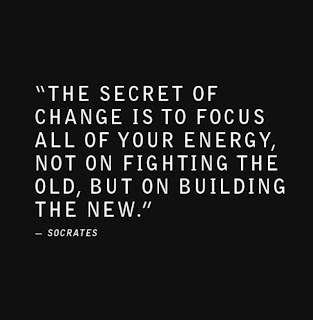Change Paradox
The truth of the matter and fact is that change is automatic part of life whether we like it or not. Imagine if there was no changes in Life? Change however is not always what we welcome, the only changes we welcome are those that satisfy our needs. However change is an inevitable part of life and nothing is forever. The greatest precursor or precondition for having a relatively fulfilled and happy life in all major realms ie. Relationships, Health, Career and Finance is to realize that (Relativism is the Ultimate Realism). Meaning our success is in realizing what stage of life we are at and that which changes are bound to occur, because the only constant in life is change. As long as we don't resist it and accept it and as long as we do not get attached too much to one set of conditions and accept to flow naturally between life stages we will have a relatively fulfilled journey. We are most susceptible at the intersection of change. To embrace change and not be caught by surprise by change is what it takes to relatively have a fulfilled life.
In this blog post I want to discuss the self-induced changes vs changes induced by environment naturally.
Lets face it if we had a chance we will never want to change and we dial back time to the time when we all were in our prime. Rarely we take the initiative to change, instead we are at the mercy of outside events. If it was for us we will always seek the comfort zone and stay in that zone. If we absolutely want to change something then we must be the cause of the change, and not change because of being at an effect of an external event. The fact is that the outside factors of change are always there and we cannot deny them, we need to work within the confines of our natural setting. However the change we self-induce feels better and gives us a sense of accomplishment which is good for our over all psychological well being. It gives us a sense of control over our life. After all who do we really want to be in charge of our life? The obvious answer is of course ourselves.
For change of behavior to be lasting with no relapse, there must be a huge need or a gab internally with an intense drive to close that gap . That change will last long and rarely anything can get between the person and that new destiny. This mode of operation makes the person be the cause of the events and not at the effect or mercy of events.
The second inducer of change is external, or we can call it S.E.E. Significant, Emotional, Event. often time shaping and changing of life can occur due to experience of these events. These Significant Emotional Event can constitute falling in love, death of a loved one, loss of a business or job, health challenges, heart breaks, failures, success etc... All these can be the precursor of a significant change.
So as much as we want to have positive change, by enlarge self-induced changes come from ownership of the decision. On the balance of probability the stronger our vision for what we want and the stronger our decision making muscle the more decisions we will make. Therefore it is imperative to make decisions that are ecologically balanced. Meaning it is not just self-centered rather it involves the well beings of ourselves, the emotional well being of other people and the world at large. If the decisions we make are made from such a balanced platform, the resulting change will be not only a great achievement, further it will be relatively fulfilling.
Have you seen people who have become great at achieving goals and changing things and not be happy or fulfilled at the end. The primary reason is that the change and goals that were set and achieved were not ecological balance.
The game of life is realizing the fact that the there is no absolute realism and the best realism in life is relativism. Most of the frustration that we experience is because of our mismatch between attachment to events; over which the only power that presides is relativism.


Comments
Post a Comment